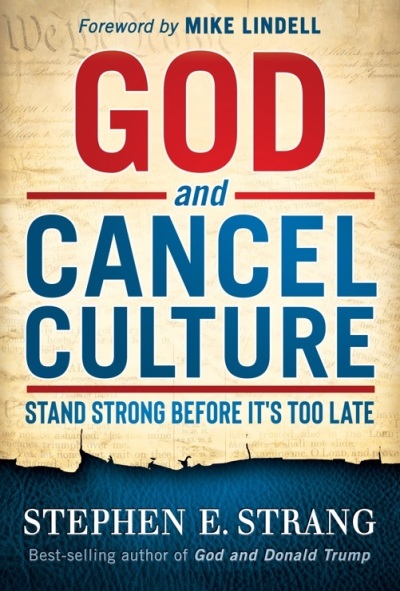Evangelical media leader blasts ‘cancel culture' in new book: ‘Enough is enough’

A prominent evangelical Christian media leader has authored a new book that seeks to spread awareness of the dangers of cancel culture to Christians.
Stephen Strang, the founder of Charisma Media and its flagship publication Charisma magazine, critiqued cancel culture and how it can negatively impact Christians in his latest book released earlier this month, God and Cancel Culture: Stand Strong Before It’s Too Late.

The book documents incidents of cancel culture committed on social media and by big businesses. Such cases include the backlash MyPillow CEO Mike Lindell got in response to his claims that the 2020 presidential election was stolen. Lindell wrote the forward for the book.
In an interview with The Christian Post, Strang said that he wrote the book because he believes that people have been “trying to cancel Christianity” in some way or another, “going all the way back to the Roman Empire.”
“It was a way to write about all the stuff that’s going on. And I am particularly concerned about cancel culture,” he explained, adding that “enough is enough.”
CP spoke with Strang about how cancel culture is a danger to Christians and how politically charged censorship should be tackled. Below are edited excerpts from the interview.
CP: In your introduction, you wrote: "Cancel culture isn't new. Censorship, propaganda, and coercion have always been tools of the powerful throughout history, going by different names in each generation and under each new, intolerant regime." Have there been times when American Christians have engaged in "cancel culture" to advance conservative ideas?
Strang: Have Christians done it? Well, if somebody said something that was heretical, of course, there was an effort not to do it. And I suppose that, in a way, Prohibition was an effort to cancel what in that generation was considered sinful behavior.
I don’t think that it's tit-for-tat by any means. But I acknowledge that trying to cancel other people is part of the human experience to some extent.
CP: The book featured comments from people who spoke of ways of fighting back, such as boycotting and "buycotting," becoming better educated about history, etc. Do you agree these strategies are good ways to fight cancel culture?
Strang: I’ve never really been an advocate of boycotts. But boycotts are so extreme on the other side now that we’re in a position where we have no option but to try to stand strong.
I believe that if we do nothing, we end up losing everything. That’s certainly the trajectory. But if we let people know that the attempts to eliminate the Christian voice and to punish Christians for believing the Bible and articulating that, that they won’t get away with it. It’s certainly not to punish, but it’s just to stand up for our rights and just say, “enough is enough.”
CP: In addition to documenting examples of social media cancel culture, you also wrote extensively about state-sponsored cancel culture, citing California's heavy restrictions on in-person worship that were eventually struck down by the Supreme Court. Do you believe that state-sponsored cancel culture will eventually become more common than social media cancel culture? Or will cancel culture always remain a mostly non-government-driven phenomenon?
Strang: Time will tell.
When the government gets involved, at some point, it becomes force of law. People can be put in jail, those kinds of things. And we certainly see that. We see it right now in communist countries.
We have a Constitution that gives us a Bill of Rights that starts with religious freedom and freedom of speech and freedom of assembly. And most Americans, including me, felt that this would continue for as long as there was America.
I personally believe that some of these governors, [California Gov.] Gavin Newsom is probably the best example, have no love for the Church. And this was an opportunity, in the name of health, to restrict churches and, even more important, to say they’re not important.
They used the term “nonessential,” that was the word. And how can you say that the Church is not essential during a crisis? If anything, people need the Church and the community of Church, especially those who are believers, to cope with depression and all kinds of other things that came with the shutdown of the pandemic.
Left-wing rioters were not expected to social distance or have masks. And they were actually lauded, by Gavin Newsom in particular.
Our constitutional rights don’t end when a crisis happens.
CP: Do you believe there are times when social media sites can justify canceling someone based on the content of their posts?
Strang: [Social media sites are] like public utilities in a way. The water company does not decide that they’re not going to give water to your house or your office just because you voted for Donald Trump or same thing with the telephone company. The telephone company won’t decide, “Oh, you belong to the Ku Klux Klan. We’re not going to give you electricity.”
Also, it’s just one-sided; It’s totally one-sided, and there’s a hostility, and it’s not just religious things.
If you say, "people get better using Ivermectin," you’re taken down. And there’s reason to believe Ivermectin works, but it goes against a certain view of how we should approach COVID-19.
There are a lot of other examples as well. And the idea that [social media sites] would take down the president of the United States, I mean it is just absurd.
I am just saying, the whole point of the book is this is absurd, that’s absurd. At what point should we say, “enough is enough?” I believe the point is now, and that’s why I wrote the book.



























